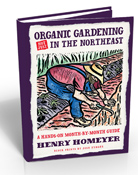Putting Away Veggies for Winter
Posted on Tuesday, October 5, 2021 · Leave a Comment
Like any industrious squirrel, I am getting food stored and ready for winter. Even if your vegetable garden is depleted, you can buy things in bulk from your local farm stand now to save for winter.
Each type of veggie has its own requirements. Some like a cool space with high humidity. Others want it cool and dry. Then there are a few, like sweet potatoes, that require a warm space and suffer in the cold. Let’s take a look.
Storing is the easiest and cheapest way of keeping veggies for a few months. Winter squash store well in a cool dry location such as under the bed in a spare, unheated bedroom. Drafty old farmhouses have plenty of good places to store them, along with cardboard boxes of onions and garlic. I’ve stored a blue Hubbard squash (which has a very thick skin) for up to a year without any problems. But they will rot in a high humidity area.
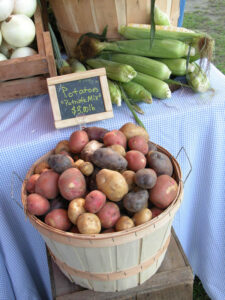
Buy potatoes now and save for a winter meal
Potatoes, carrots, kohlrabi, rutabagas, celeriac or celery root, turnips and parsnips will store for months at 35 to 50 degrees with high humidity. You can do that in a spare fridge, preferably in a drawer that keeps humidity in it. Or put them in zipper bags and punch a few breathing holes in the bags. You can put an inch of moist sand in a bucket, and store carrots in the garage if it stays cold, but not frigid. Keep a lid on the bucket, and check from time to time. Rodents love carrots and potatoes, so you can’t store them in an open container.
I built a “cold cellar” for storing potatoes in my cold basement that often has temperatures below freezing. I made a bin of cement blocks, two layers high, and covered it with an insulated plywood lid. I weighted the lid to be sure mice could not sneak in. I put a heat mat in the bottom to use if temperatures neared freezing in the box.
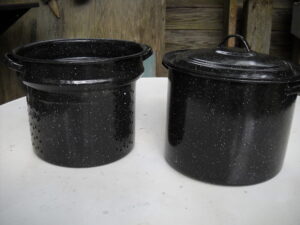
A blanching pot is useful if you plan on freezing veggies 004
A full-sized freezer is a good investment. Among other things, tomatoes, corn, broccoli, beans, peppers, kale and fruit store well in a freezer. I freeze them in freezer-grade zipper bags. You can suck the excess air out of the bag with a drinking straw by closing the seal up to the straw, then pulling it out quickly and snapping shut while still sucking on the straw.
Freezing is a time-honored process for storing food. Some veggies need to be blanched before freezing to keep them tasty. Blanching is a quick immersion in boiling water before freezing. It kills the aging enzymes in your vegetables, keeping them fresh-tasting longer. If you know you will eat your frozen things within 3 months, don’t bother with it. I recommend blanching beans, beets, broccoli, Brussels sprouts, carrots, cauliflower, corn, kale, peaches, squash and Swiss chard. I freeze apples, peppers and tomatoes without blanching.
If you blanch, just do it for 60 seconds, which is often even before the water has come back to a full boil. Use lots of water in a big pot, and not too many veggies. There are special pots sold for blanching. They have an inner pot with holes that help you lift the veggies out of the water quickly.
If you blanch veggies too long they will be mushy. Drop the blanched veggies in a sink of cold water, spin dry in a salad spinner, and blot with a cloth dish towel. Then bag and freeze.
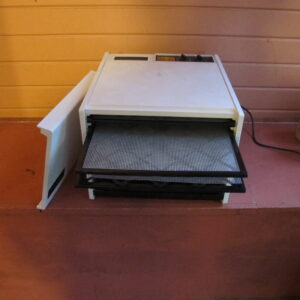
Excalibur dryer does a good job drying tomatoes, apples and hot peppers
I also dehydrate foods, notably tomatoes, hot peppers, apples and pears. You can buy a good dehydrator like the ones made by Nesco American Harvest for somewhere under $150. Or you can buy the Cadillac of dryers and get an Excalibur for $300 or more. Those use less energy and dry the food evenly without having to rotate the trays.
Dehydrating is great for hot peppers: I dry them until they are brittle, then grind them in my coffee bean grinder. That way I have a powder I can add to soups or stews a little at a time and that is well distributed. And I dry cherry tomatoes cut in half; I use them in soups and stews. They offer a bite of summer.
I also make tomato paste and freeze it in ice cube trays. I often do this with imperfect tomatoes: I cut out the bad parts and put the rest in a Cuisinart to blend them into a loose “soup” that I then cook down slowly in a big enameled cast iron pot. When I can literally stand a spoon up in the mix, it is done. Having a supply of tomato paste is essential for cooking, and I like that I don’t have to open a can when I need just a little.
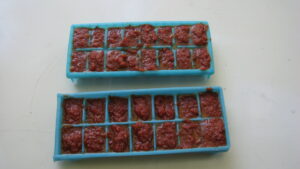
I freeze tomato paste for storage in ice cube trays.
If you have an apple tree, you probably have already made some apple sauce this year. It freezes well, and is always tasty. But have you made cider? You don’t need to buy a cider press. I bring apples to my local orchard, and ask them to press and bottle the juice. Be sure to tell your orchardist that you are freezing it, and to leave an inch of space for expansion. They will charge you a fee, but it is well worth it for the satisfaction of having your own cider in winter.
Lastly, have you thought of making sauerkraut? Cabbages are easy to grow – or inexpensive to buy at your local farm stand. If you want to learn the basics just Google my name and “sauerkraut”. I wrote a full article on it in 2015 and it is available on-line along with book recommendations for in-depth learning.
One last bit of advice: don’t freeze or store any veggies or fruit that are not perfect. Freezing rotten food does not make it better! And you will not want to eat it later if you don’t want to eat it now!
Henry is an organic
gardener. He tries to eat something that came from his
garden every day of the year! Reach him at
henry.homeyer@comcast.net or PO Box 364, Cornish Flat, NH 03746.

